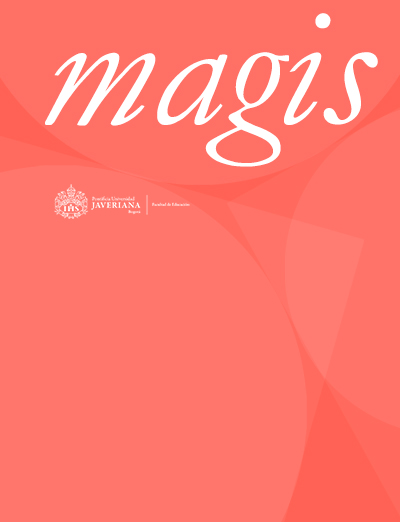Abstract
This article analyzes the reconstruction of the biographical reasons why 24 student teachers at the secondary level wish to enter and voluntarily remain in a course for practical training in a center for the protection of minors. It is a qualitative study, of a narrative type, which follows the course of a semester. The results show that the development of teaching practices in contexts of inequality, accompanied by permanent processes of narrative-biographical reflection, leads the participants to question and become more aware of their role as educators and to feel part of their people and their history, and thus interweave a formative project which fights for social justice, in a process of reconstruction where the biographical becomes political and the political, a biographical exercise.
Anderson, G. & Herr, K. (2007). El docente investigador: la investigación-acción como una forma válida de generación de conocimientos. En La investigación educativa: Una herramienta de conocimiento y de acción (pp. 47-70). CEP.
Bastías, L. & Iturra C. (2022). La formación inicial docente en Chile: Una revisión bibliográfica sobre su implementación y logros. Revista Electrónica Educare, 26(1), 229-250. http://dx.doi.org/10.15359/ree.26-1.13
Bolívar, A., Domingo, J. & Fernández, M. (2001). La investigación biográfico-narrativa en educación: enfoque y metodología. La Muralla.
Cochran-Smith, M. (2009). Toward a Theory of Teacher Education for Social Justice. En A. Hargreaves et al. (eds.), Second International Handbook of Educational Change, 23. Springer International Handbooks of Education. https://link.springer.com/chapter/10.1007/978-90-481-2660-6_27
Connelly, M. & Clandinin, D. J. (1994). Telling Teaching Stories. Teacher Education Quarterly, 21(1), 145-158. https://www.jstor.org/stable/23475539
Connelly, F. & Clandinin, D. (2006). Narrative inquiry. En J. Grenn, G. Camilli & P. Elmore (Eds.), Handbook of complementary methods in education research (pp. 477-487). Lawrence Erlbaum. https://doi.org/10.4324/9780203874769
Delory-Momberger, C. (2014). Experiencia y formación: biografización, biograficidad y heterobiografía. Revista Mexicana de Investigación Educativa, 19(62), 695-710. https://www.comie.org.mx/revista/v2018/rmie/index.php/nrmie/article/view/202
Díez-Gutiérrez, E. (2020). Ideología en la formación inicial docente. Revista Iberoamericana de Educación, 82(2), 9-25. https://doi.org/10.35362/rie8223658
Freire, P. (1993). Pedagogía de la esperanza, un reencuentro con la pedagogía del oprimido. Siglo XXI.
García, L. (2021). Pedagogía por proyectos en el aula: hacia una inclusión educativa genuina. Oralidad-es, 7, 1-13. https://doi.org/10.53534/oralidad-es.v7a6
Goodson, I. (1992). On curriculum form: Notes toward a theory of curriculum. Sociology of Education, 65(1), 66-75. https://doi.org/10.2307/2112693
Jiménez, F., Fardella, C. & Chávez, J. (2018). La vulnerabilidad escolar como mito: desafíos para el trabajo docente en entornos de exclusión social. Athenea Digital. Revista de Pensamiento e Investigación Social, 18(3), 2147. https://doi.org/10.5565/rev/athenea.2147
Jiménez, M. & Valle, A. (2017). Lo educativo como experiencia fenomenológica. Praxis & Saber, 8(18), 253-268. https://doi.org/10.19053/22160159.v8.n18.2017.7243
Larrosa, J. (2003). Entre las lenguas: lenguaje y educación después de Babel. Laertes.
Leiva, R., Herrera, C., Núñez, M., & Gallego, C. (2022). Diversidad e inclusión: experiencias biográficas y cuestionamientos a la formación inicial docente. Revisión Humana. Revista Internacional de Humanidades, 13(2), 1–17. https://doi.org/10.37467/revhuman.v11.4022
Moraes, M, & de la Torre, S. (2002). Sentipensar bajo la mirada autopoiética o cómo reencantar creativamente la educación. Revista Creatividad y Sociedad, 2, 41-56. http://creatividadysociedad.com/wp-content/uploads/2019/10/revista-CS-2.pdf
Murillo, G. J. (2017). Pedagogía biográfica en los bordes. Revista del IICE, (41), 47-58. https://doi.org/10.34096/riice.n41.5157
OECD. (2004). Informe de educación chilena. OECD/Ministerio de Educación.
Porta L. & Yedaide, M. (2013). La pasión educa: enunciaciones apasionadas de profesores memorables universitarios. Revista Argentina de Educación Superior, 6, 35- 50. http://www.revistaraes.net/revistas/raes6_conf4.pdf
Puig, J. (2009). Aprendizaje servicio. Educación y compromiso cívico. Graó.
Rodríguez, R. (2015). Una experiencia de aprendizaje-servicio en comunidades de aprendizaje. Profesorado: Revista de Curriculum y Formación del Profesorado, 19(1), 314-333. https://recyt.fecyt.es/index.php/profesorado/article/view/41039
Silva, I. & Paz, P. (2019). Formación docente para la justicia social desde la perspectiva emocional: Indagaciones narrativas en el contexto de la revolución del torniquete. Revista Interuniversitaria de Formación del Profesorado, 94(33.3), 195-212. https://recyt.fecyt.es/index.php/RIFOP/article/view/75652
Silva-Peña, I., Hizmeri-Fernández, J., Hormazábal-Fajardo, R., González-García, G., Rojas-Rodríguez, B. & Jara-Illanes, E. (2021). Repolitización de la formación inicial docente en un Chile post pandémico. En M. Romero y S. Tenorio (eds.), La educación en tiempos de confinamiento. Perspectivas de lo pedagógico (pp. 511-536). Fondo Editorial UMCE.
Valliant, D. (2019). Formación docente desde y para la justicia social en América Latina. Políticas Públicas para la Equidad Social, 2, 83-92. https://dialnet.unirioja.es/servlet/articulo?codigo=7690410
Vargas, O., Giraldo, Y. & Martínez, M. (2017). La emoción como estrategia movilizadora de la acción política de niños, niñas y adolescentes. Revista Lasallista de Investigación, 14(2), 152-159. https://doi.org/10.22507/rli.v14n2a14
Zárate, L. (2007). Rousseau y la función social de la educación superior. En M. E. Murueta (Ed.), Educación en cuatro tiempos: Rousseau, Kant, Marx, Nietzsche interpretados para el siglo XXI (pp. 25-58). Amapsi.

This work is licensed under a Creative Commons Attribution 4.0 International License.
Copyright (c) 2024 Marcela Blanca Gaete-Vergara, Mauricio Núñez-Rojas



